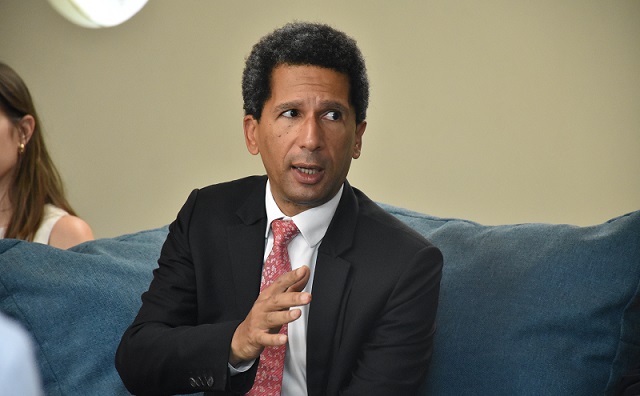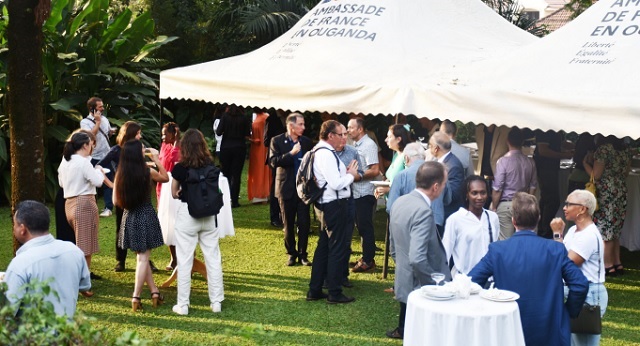
Amb. Sticker says France is determined to strengthen its cooperation with east African country
Kampala, Uganda | RONALD MUSOKE | France intends to shore-up its enduring cooperation with Uganda by investing more millions of Euros into the country’s energy and water and sanitation sectors this year, according to Xavier Sticker, the French Ambassador to Uganda.
Amb. Sticker says the France-Uganda partnership is underpinned by the AFD portfolio which is currently worth about €800 million (ongoing projects) and this is complemented by another €400 million portfolio of the AFD subsidiary, Proparco, which directly supports private sector-led investments.
Top on the agenda this year for the French government is the refurbishment of the Kiira-Nalubaale hydro-electric power dam complex along the River Nile in Jinja.
“The plan for the rehabilitation of this dam is to ensure that its full potential can be realized,” Sticker told a select group of journalists on Jan.30 at his residence in Kampala, adding that, “Funding for the rehabilitation will be done by the French Development Agency (AFD) in conjunction with the European Union and the European Investment Bank.”
Up to €85 million has been provided for the refurbishment and this includes; a loan of €73 million from AFD, a grant of €2 million from AFD as well as another grant of €10M from the EU Delegation in Uganda.
At the moment, Uganda’s total hydropower capacity is slightly below 1000MW and the Kiira-Nalubaale hydropower complex produces a third of this electricity. Amb. Sticker says the renovation will be a game-changer for Uganda which has embarked on an aggressive industrialization agenda. “We are happy and privileged to be part of Uganda’s journey towards industrialization,” he said.
At the meeting, Amb. Sticker was flanked by Marc Trouyet, the AFD Country Director in Uganda, Thomas Pelletier, the President of the Kampala Business Club, Yves Mercier, the head of cooperation and cultural affairs at the French Embassy in Uganda and others as he unveiled France’s programme for Uganda, this year.
Trouyet said the AFD Board in Paris had approved funding for the rehabilitation of the Kiira-Nalubaale Hydro-Electric Power plant because “it is an interesting electricity system for Uganda.” “It needs to be rehabilitated because it is the oldest hydro-electric power plant and (yet) it produces the cheapest electricity which allows the system to provide the most affordable electricity,” he said.
Clean water for Ugandans
Away from the energy sector, Amb. Sticker says the AFD, whose overall investment portfolio in Uganda is worth about €1.2 billion also intends to ramp up its investment in Uganda’s water and sanitation sector to provide more clean drinking water for people living in informal settlements.
Thanks to funding from AFD and other development partners, the Katosi Water Treatment Plant on the northern shores of Lake Victoria in Mukono District was completed a few years back and now provides clean water to about five million people living in Greater Kampala Metropolitan Area (Kampala, Wakiso and Mukono districts).
“There will be more this year thanks to extra contribution from AFD as one of the main funders,” Sticker said, “The resources are blended between the AFD, the EU and the European Investment Bank.”
“About 450,000 people living in informal settlements of the capital city will get access to clean drinking water.” In addition, the ambassador says, there will be provision of water of high quality to another 250,000 inhabitants in Greater Kampala Metropolitan Area.
In southern Uganda, the AFD which has sunk another €75 million in a water treatment plant at River Kagera and the first phase of the project will be completed in the second half of this year. It is expected the water treatment complex will provide drinking water to about 350,000 people for the whole Isingiro District including the nearby Nakivale Refugee Settlement. Later, the water distribution network will be extended to Mbarara City so it provides water to up to one million people.
“The facility will definitely improve the living standards of people in the region, especially the women refugees in Nakivale Refugee Settlement who are currently moving long distances in search of water,” Amb.Sticker said.
Economic diplomacy
Amb. Sticker says Uganda’s economy is a key aspect of the France-Uganda partnership and this is exemplified by more than 40 French companies currently operating in Uganda. These are led by French super major, TotalEnergies, which has so far invested about US$ 4 billion in developing the country’s oil and gas infrastructure to ensure Uganda commercializes its petroleum resource in two years’ time.
Yet, TotalEnergies is not the only French firm that has found a home in Uganda. There are more in the water and sanitation sector; energy (outside oil and gas), distribution services, and logistics and transport sectors.
The ambassador says the French companies do business in the country with majority of Ugandan staff and they contribute to thousands of jobs. “In terms of investment, statistics don’t do justice to the reality underneath and the reality is that French companies directly or indirectly are top investors in Uganda,” he said.
He says there are also French companies working in the mini-grid and off-grid solar capabilities of the country. “So, we are already working with the government on its transition, production but also transmission and distribution of electricity because you cannot address the issue of access to energy in the transition period without actually tackling the different stages.” Trouyet says the AFD is actually the investor behind the Mbarara-Masaka high voltage transmission line and its ongoing portfolio in Uganda’s energy sector is between €200-300 million.
More French companies coming
Amb. Sticker says he hopes to bring more French companies to Uganda via MEDEF (Mouvement des Enterprises de France), a powerfu French association which brings together close to 170,000 French businesses.
“We also expect visits of two delegations of French companies in the course of this year,” he says, “We are happy to have the permanent presence of the French Business Club of Kampala which offers advice to companies willing to come and prospect for business opportunities in Uganda.”

Amb. Sticker says he is happy with the growing interest of French companies in investing in Uganda. For instance, he says, when he first arrived in Kampala at the end of 2022, there were about 40 companies in the French Kampala Business Club; 14 more than the number his immediate predecessor, Amb. Jules-Armand Aniambossou had found.
Now, there are over 60 companies in the French Kampala Business Club, an association which brings together the CEOs of French and Ugandan companies. He also hopes French companies will contribute in numbers to the EU-Uganda Business Forum coming up in early March under the auspices of the European Union Delegation in Uganda.
Amb. Sticker says France will keep cooperating on values; women’s rights, humanitarian support to refugees in Nakivale and Kyangwali settlements. “On values, debates are part of values and the way to ensure that there are values is through debate and dialogue on values, principles and ideas,” he says.
He says the embassy in partnership with Konrad Adenauer Stiftung Foundation will carry on this year with the organization of the seventh edition of the Kampala Geopolitics Conference at Makerere University with the refugee crisis forming one particular area of focus. He says the issue of refugees is important to the French engagement in Uganda and this is shown in their continued support to the refugee response.
Last year, for instance, France contributed close to €1 million which was earmarked for UNHCR and we funded the salaries of the teachers in 37 secondary schools and food aid. You can trust our continued involvement in this area.
One other critical area where France will continue cooperating with Uganda is in the area of peace and security. “We have a common commitment on peace and stability of East Africa and the Great Lakes region and we will continue our cooperation in this area which with regular visits of the French military officers to partner with the UPDF on training and troop deployment in Somalia and Operation Shujaa in eastern DR Congo.”
Ugandan youth
Amb. Sticker says the France-Uganda cooperation is also keen on realizing the potential of the Ugandan youth. He says, since the average age in Uganda is 16 years, it is very important to develop their full potential.
“France is in Uganda for the long term and it is important to ensure that the Ugandan youth’s potential is not impeded,” he says, “We want to strengthen our cooperation and that means knowing each other better and having more communities of interest which sustain that partnership.
The French diplomat says, the embassy in Uganda is privileged to rely upon two institutional pillars in Kampala; the French International School of Kampala which currently has 280 pupils (primary up to A-Level) and Alliance Française de Kampala, the French language and cultural centre.
To boost enrollment in both institutions, new state-of-the-art facilities have been completed and inaugurated on the French International School of Kampala. “That school will continue its expansion this year in terms of investment but also its capacity so it hosts Ugandan and many more other pupils,” he says. He says the embassy intends to continue offering support the French curriculum in Uganda’s education system especially in Uganda’s universities.
Meanwhile, besides continuing to offer the French language course, the Alliance Française de Kampala will also launch several programmes in the cultural realm. It will, for instance, be able to host young Ugandan film directors who don’t have spaces to showcases their works.
Going forward, the embassy is hoping to have more exchanges between young French and Ugandan students. This, he says, could be through language but it could even be better if this relationship is enriched by direct exposure through having both young French and Ugandans travel to each other’s countries.
“This is an area that will also focus more resources; it means more opportunities for Ugandans to travel and study in France.” To start off this exchange programme will be the visit of about a dozen French universities to Uganda in the first week of March.
“They will interact not only with the education system but also directly with Ugandan universities to see how they can improve curricula and even see whether French and Ugandan students can do part of their academic programme in either country.”
France at centre of Uganda’s energy transition
Although there is ongoing opposition to Uganda’s oil and gas sector because of its potential contribution to global warming and climate change, environmental activists both local and foreign, are in favour of cleaner energy and accelerating economies towards net-zero of carbon emissions over the coming years. Trouyet, the AFD Country Director in Uganda says France through AFD is actually financing Uganda’s energy transition plan.
For instance, he notes, the Ministry of Energy’s transition strategy presented at COP28 in Dubai, the U.A.E, last December, was put together thanks to an AFD-funded study. The transition plan has forecasted Uganda’s growth in emissions and their reduction. It notes that Uganda’s emissions peak is scheduled for around 2045 while Uganda will become “carbon neutral” in 2060.
“We have been financing the study; working with the government on that and there is more work to be done among which includes the kind of investments required to accompany the government’s carbon neutrality ambition,” said Trouyet.
“We have started the conversation with the government to see what will be the social, fiscal, economic and environmental impact of such transition.
 The Independent Uganda: You get the Truth we Pay the Price
The Independent Uganda: You get the Truth we Pay the Price





